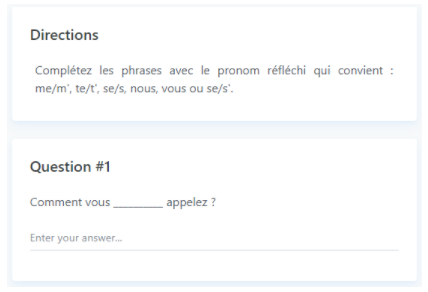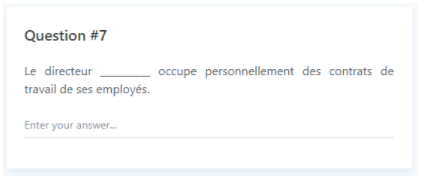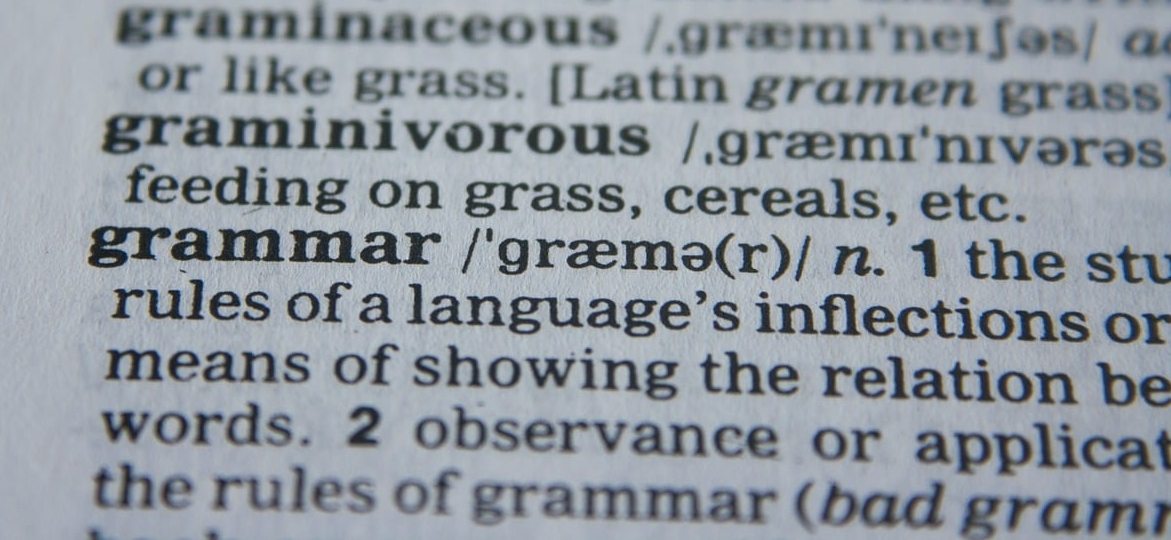In this article, we’re here to guide you through all the need-to-know information when it comes to understanding and using reflexive verbs in French. We’re going to talk about:
- What a reflexive verb is
- How to conjugate them
- Common reflexive verbs in French
- Helpful exercises
- How to learn French from scratch with General Français, our top-notch language learning corse!
Have you got your notepad and pen? Let’s get started
If you wish to take the tests DELF, DALF or TCF revising all our french grammar and conjugation worksheets is always a great idea!
What are French reflexive verbs
Reflexive verbs in French are verbs that conjugate with a reflexive pronoun. These verbs indicate that the action of the verb is being performed by the subject, on the subject.
Here are some examples of reflexive verbs in action:
- Je me lave (“I wash myself”)
- Il se fâche facilement (“He gets angry easily”)
- Nous nous couchons à 22 heures (“We go to bed at ten o’ clock”)
- Ils s’inscrivent à la bibliothèque (“They are signing up at the library”)

How to conjugate reflexive verbs in French
Conjugating reflexive verbs in French is quite simple if you’re already familiar with other verb conjugations. Follow these steps:
- Conjugate the verb to fit with subject of the sentence, e.g. je, nous, ils
- Add the reflexive pronoun that agrees with the subject
Study the table below to understand the different reflexive pronouns and how they correspond to subject pronouns:
| Subject pronoun | Reflexive Pronoun |
|---|---|
| je | me |
| tu | te |
| il, elle, on | se |
| nous | nous |
| vous | vous |
| ils, elles | se |
Now you’ve got all the essential information, let’s look at how the reflexive verb se laver conjugates in French:
Se laver (“to wash”)
je me lave
tu te laves
il/elle/on se lave
nous nous lavons
vous vous lavez
ils/elles se lavent
How to use a reflexive verb in a sentence
Once you know how to conjugate a reflexive verb in French, you’ll be using them in sentences in no time. Reflexive verbs generally occupy the same position as ordinary verbs in the simple tenses.
Here are some examples:
- Je me connecte régulièrement sur les réseaux sociaux (“I log on to social media regularly”)
- Nous nous connaissons depuis l’enfance (“We have known each other since childhood”)
- Les filles ne se levaient jamais avant 9 heures (“The girls never got up before 9 o’ clock”)
As you can see in the final example, the negation positions itself around the entire reflexive phrase (verb + pronoun).
Using a reflexive verb in French is slightly more complicated when we encounter composed tenses, such as the passé composé. Here’s an example:
- Hier, vous vous êtes bien amusés avec vos amis (“You had a good time with your friends yesterday”)
As you can see, the reflexive phrase is composed of several elements here: the reflexive pronoun, vous; the conjugated auxiliary verb, êtes; and the past participle in agreement with the subject, amusés. The original reflexive verb in French was: s’amuser.
When we use a reflexive verb in French in a composed tense, other grammatical elements can be inserted into the reflexive phrase. In this case it is the adverb bien.
The difference between reflexive, pronominal, and reciprocal verbs
Did you know that reflexive verbs are part of a family of pronominal verbs? Thought not! Pronominal verbs are verbs that use a reflexive pronoun, as we’ve seen a little earlier. There are four types of pronominal verbs:
- Reflexive verbs
- Reciprocal verbs
- Passive verbs
- Subjective verbs
Let’s take a closer look at reciprocal verbs.
Reciprocal verbs are used when the subjects of the verb carry out an action on each other. Here’s an example:
- Ils se voient tous les jours (“They see each other every day”)
In this example, the subject is ils and the reflexive pronoun functions as “each other” rather than “themselves”, as it would in a reflexive sentence.
Worksheet of the most common reflexive verbs
To get you started using reflexive verbs in French, we’ve put together a list of ten of the most commonly used:
| s’adresser à | to address, to speak to |
| se fier | to trust |
| s’habituer à | to get used to |
| s’inquiéter | to worry |
| se lever | to get up |
| se réveiller | to wake up |
| se dépêcher | to hurry |
| s'habiller | to get dressed |
| s'inscrire | to sign up, to enroll, to register |
| s reposer | to relax |
There are lots more reflexive verbs in French, and many of them are used regularly in everyday conversations.
Practice exercises
When you encounter a new grammar topic in a foreign language, the best thing; to do to solidify your new knowledge is to put it into practice using exercises.
You can find hundreds of grammar exercises on GlobalExam, grouped into topics to target specific grammatical concepts. Completing simple exercises helps to identify your weaknesses, and to put theoretical knowledge into context. Below are some examples of simple practice exercises on reflexive verbs in French.
In this first example, you must choose the correct reflexive pronoun to match the sentence:

The correct answer is vous.
For this next question, you have to decide which reflexive pronoun fits with the subject of the verb, le directeur:

The correct answer is se, which becomes s’ before occuper.
Studying French grammar with GlobalExam
If this quick guide to reflexive verbs in French has whetted your appetite for French grammar, we’ve got some good news: there’s plenty more where this came from on GlobalExam!
If you’re learning French, we’ve got a whole host of tools and resources to help you progress at your own pace on our sophisticated e-learning platform.
Sign up with a free account to get access to study sheets dedicated to tricky grammar topics and vocabulary lists. You can also use our platform to test your knowledge using grammar and vocabulary exercises, or even prepare for a specific language exam.
Whatever your level, whatever your methods, we’ve got the tools to help you!
More articles on French conjugation:
- French Conjugation: All you need to know about Verbs And Tenses
- French Future Tense: How Does The Conjugation Work?
- Past Participle Tense In French: Regular And Irregular Verbs
- What Is The Imperfect Tense In French? Structure And Examples
- French present Tense: How Does The Conjugation Work?
- Subjunctive In French:Practice The Conjugation And Phrases
- Conditional Tense In French: Understanding The Structure



